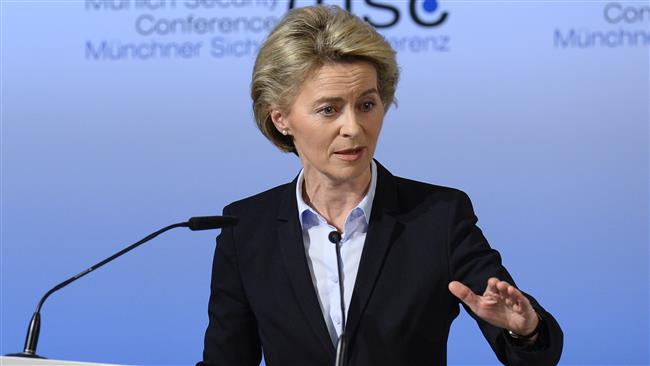Germany warns of Turkey’s NATO departure as Ankara-Amsterdam tensions soar
Germany has warned against Ankara’s departure from NATO as tensions continue to escalate between Turkey and the Netherlands over an upcoming constitutional referendum that would expand the Turkish president’s powers.
"Turkey is not making it easy for us within NATO. But no one should believe that a Turkey outside NATO would listen better to us or would be easier to deal with than a Turkey in NATO," German Defense Minister Ursula von der Leyen told AFP on Wednesday.
The German defense minister also said Berlin “must not abandon the many Turks who don't want an expansion of the president's powers with the upcoming referendum."
A bitter feud broke out between Turkey and the Netherlands last week after the Dutch government barred Turkish Foreign Minister Mevlut Cavusoglu from flying to Rotterdam.
The Turkish minister was scheduled to attend a rally as part of a campaign to garner support for the April referendum that would give the presidency sweeping new powers.
Austria and Switzerland have also canceled several similar rallies due to the growing dispute.
Turkish President Recep Tayyip, who is seeking to rally expatriate Turks living in Western Europe, especially in Germany and the Netherlands, has responded by comparing Dutch leaders to Nazis. He had earlier made a similar comment about the German government.

On Tuesday, German Interior Minister Thomas de Maiziere said Ankara was playing the victim with its strong criticisms against NATO allies to galvanize support ahead of the referendum.
EU expects Turkey to honor refugee deal
Meanwhile, the soaring tension between Ankara and European countries has raised concerns that a fragile EU-Turkey deal to stem the flow of refugees to Europe might fall apart.
Turkey has threatened to re-evaluate its agreement with the European Union over the escalation of the diplomatic row with the bloc’s member states.
Read more:
However, the EU said on Wednesday that it was committed to the refugee deal and expected Ankara to do the same.
"We remain committed to the application of the EU-Turkey (agreement)," said a spokesperson for the European Commission, the executive arm of the EU. "This is a contract of mutual trust and delivery; we expect that both parties will comply with their commitments."
The EU-Turkey deal, which was reached in March 2016, sees refugees returned to Turkey in exchange for aid and political concessions.
Under the agreement, refugees arriving in Greece are sent back to Turkey if their asylum claim is rejected. In return, EU countries take in Syrian refugees from Turkey and reward it with money, visa waiver and progress in Ankara's EU membership negotiations.
48-year-old Palestinian man serving 48 life terms completes 22 years in Israeli jails
From MKO to Tondar, how Germany became safe haven for anti-Iran terror groups
Hamas open to any proposal aiming to end Gaza war: Hamdan
Role of private sector in Iran’s thriving space industry
Four Palestinians killed in Israeli strikes on West Bank
Iran warns of ‘calculated, precise’ response to Israeli aggression
After year-long genocide, Israeli military hires private firms to flatten buildings in Gaza
Malaysia working on resolution to expel Israel from United Nations















 This makes it easy to access the Press TV website
This makes it easy to access the Press TV website